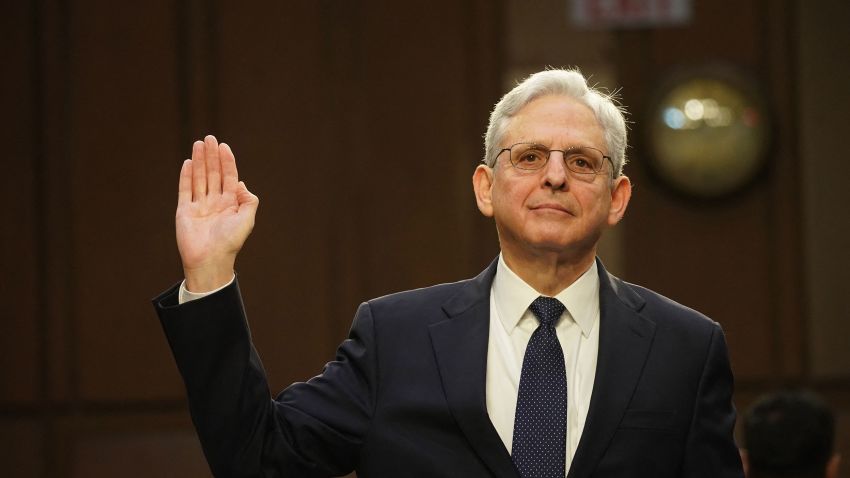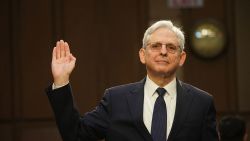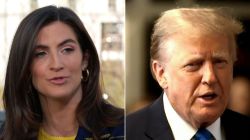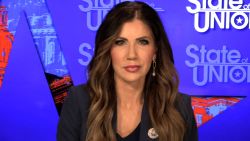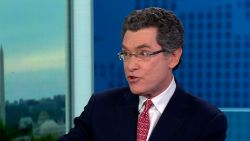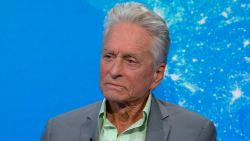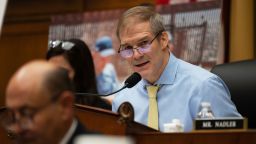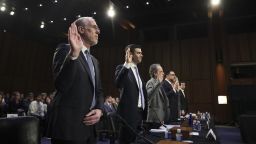Attorney General Merrick Garland appeared before a Senate committee on Wednesday, where he faced a colorful array of questions on everything from the federal investigation into Hunter Biden to the sale of deadly drugs, Taylor Swift tickets and FBI investigations.
Garland’s nearly four-hour-long hearing before the Democratic-controlled Senate Judiciary Committee marked his first trip to Capitol Hill this year. It comes as investigations into President Joe Biden and former President Donald Trump have taken center stage in recent months.
The attorney general’s opening statement touched on topics like efforts to combat the rise of violent crime and hate crimes, work to protect reproductive freedom across the country, and the department’s accomplishments in partnering with the Ukrainian government against Russian aggression.
“Every day, the 115,000 employees of the Justice Department work tirelessly to fulfill our mission: to uphold the rule of law, to keep our country safe, and to protect civil rights,” Garland said, lauding efforts to protect “our country’s democratic institutions.”
Here are takeaways and key moments from the hearing:
Garland says he has not interfered in Biden probe
Garland stressed that he will not interfere with the Delaware US attorney’s ongoing investigation into Hunter Biden that is focused on taxes and other issues.
“I have pledged not to interfere with that investigation, and I have carried through on my pledge,” Garland said, responding to questions from Republican Sen. Chuck Grassley on the probe.
Garland reiterated that the US Attorney in Delaware, David C. Weiss, has “full authority” to carry out the investigation and to bring in another jurisdiction if necessary. Garland said Weiss “is not to be denied anything that he needs.”
He also said that it “would be a national security problem” if President Biden’s son had been receiving payments from a foreign government as a means to influence the administration.
“If it’s an agent of a foreign government asking someone and paying someone to do things to support that foreign government in secret, yes, I definitely think that would be a national security problem,” Garland said.
The questions reflect Republican suggestions that the younger Biden had made lucrative business deals because foreign governments were attempting to get to his father.
Hunter Biden has denied criminal wrongdoing in his business activities.
Garland disavows memo referring to ‘radical traditionalist’ Catholics
Garland disavowed an FBI field office memo that seemed to suggest the FBI was targeting “radical traditionalist” Catholics, calling the memo “appalling” and saying the FBI is investigating its origin.
“It’s appalling. It’s appalling,” Garland said. The FBI “has withdrawn it, and it’s now looking into how this could ever happen,” he added.
Garland continued: “The FBI is not targeting Catholics, and as I’ve said, this is an inappropriate memorandum. And it doesn’t reflect the methods that the FBI is supposed to be using – should not be relying on any single organization without doing its own work.”
The memo was originally issued in a field office earlier this month and was almost immediately pulled.
In one exchange during Garland’s hearing, Republican Sen. Josh Hawley of Missouri asked the attorney general whether the department had informants in Catholic churches.
“I don’t believe we have any informants aimed at Catholic churches,” Garland replied, adding: “We have a rule against investigations based on First Amendment activity, and Catholic churches are obviously First Amendment.”
“Out department … protects all religions and all ideologies, does not have any bias against any religion of any kind,” he said.
Tense exchange over DOJ and parents
Garland at one point engaged in a tense back-and-forth with Republican Sen. John Kennedy of Louisiana about debunked claims that, under his leadership, the DOJ is trying to interfere with parents’ ability to make complaints about schools.
The claims stems from a 2021 letter from The National School Boards Association asking the DOJ to “deal with” the uptick in threats against education officials and equating that activity to “domestic terrorism.” Garland released a memo encouraging federal and local authorities to work together against the harassment campaigns levied at schools, but never endorsed the “domestic terrorism” notion.
“Didn’t you understand the chilling effect that it would have to parents when you issued your directive – when you directed your criminal divisions and your counter terrorism divisions, to investigate parents who are angry at school boards and administrators during Covid?” Kennedy asked.
“I did not do that. I did not issue any memorandum directing the investigation of parents who are concerned about their children,” Garland shot back, adding that to the contrary, the memo states “that vigorous public debate is protected by the First Amendment and the kind of concerns that you’re talking about, as expressed by parents, are of course completely protected.”
He later added: “This is about the third time I’m being asked about the same memorandum and each time I’ve said, and I hope that the senators would go ahead and advise their constituents in the same way, that this is not what we do.”
“We are not in any way trying to interfere with parents making complaints about the education of their children,” Garland said.
Targeting online sale of deadly drugs
Judiciary Committee Chairman Dirk Durbin, an Illinois Democrat, pushed Garland on whether social media companies should be liable for the illegal sale of deadly drugs, comparing their online sale to a “suicide pact.”
“I don’t want to put words in your mouth, but I think Section 230 has become a suicide pact,” Durbin said, referring to a section of the Communications Decency Act that shields tech platforms from being sued over the content users post. “We have basically said to these companies, ‘you are absolved from liability, make money’ … and deaths result from it, and we have a responsibility.”
Garland agreed that “we do have to do something to force (tech platforms) to provide information, to search their own platforms for sales of illegal drugs,” and pledged that the committee has the DOJ’s support in efforts to reduce the online sale of deadly drugs and target algorithms that may be boosting their sale.
The attorney general added that the department supports “a better way to get the social media companies, whether it’s civil or criminal, to take these kinds of things off their platforms.”
Security for Supreme Court justices
Garland was grilled by Utah Republican Sen. Mike Lee about the absence of charges – after demonstrators protested for weeks in front of the justices’ residences in the wake of the leaked opinion to overturn Roe v. Wade opinion – under a law that prohibits “picketing or parading” in front of a federal judge’s home.
“It is concerning to me,” Lee said. “When you show up at the home of a public official, you’re sending the message of implicit violence.”
The attorney general said he did not know if the department had brought any cases under the statute. But, Garland said, the “thing that mattered” was his move, after the leak of a draft opinion, to order the US Marshals Service to protect the justices and their homes 24/7.
“No attorney general ever ordered that before. And no Justice Department had ever done that before,” Garland said, adding that 70-plus US Marshals were deployed for the protection of the justices.
“They are on site, but their priority job is protection,” Garland said. “That is why when someone did come to assault Justice (Brett) Kavanaugh, he had to walk – go away from where they were, because there were two marshals in front of the house – and eventually he self-reported (himself).”
How the US Marshals handled the alleged assassination attempt against Kavanaugh has been scrutinized. The man accused of attempting the attack was only apprehended after he texted his sister and she called 911, according to information released by local law enforcement.
Quoting Taylor Swift
At least two senators brought up a controversy surrounding Ticketmaster after the service failed to process orders for Taylor Swift’s upcoming tour, leaving millions of fans unable to buy tickets or without their ticket even after purchase.
The Justice Department has reportedly opened an antitrust investigation into Live Nation Entertainment, the owner of Ticketmaster.
Garland said that any concentrated industry is a “problem for competition” as he faced questions about the probe, and, quoting Swift, said the department knows “all too well” about the importance of industry competition. He told senators that “you can be confident that in all of our work, we approach it with an understanding that highly concentrated industries are a problem for competition.”
Not revisiting internal DOJ legal stances
Garland refused to commit to revisiting internal DOJ legal stances that are issued in opinions from the department’s Office of Legal Counsel, even if those stances have been rejected by federal judges.
OLC opinions do not carry the legal weight of a ruling from a court, but are binding across the agencies of the executive branch. Critics of the OLC’s continued embrace of its positions – and particularly positions asserting sweeping executive privileges – say that it allows the White House to avoid scrutiny by lawmakers with years of litigation over congressional subpoenas.
Garland was questioned on the issue by Sen. Sheldon Whitehouse, who pointed specifically to a ruling by Justice Ketanji Brown Jackson – from when she sat on the federal district court in DC – that rebuked the department’s position that an “absolute immunity” precludes close presidential advisers from even appearing for testimony when subpoenaed by Congress.
“You have OLC opinions that appear to be flat out wrong by the determinations made by those whose job it is to say what the law is – the Article III judge – and there’s no effort to ask them in that fairly unique circumstance to go back and … fix it,” said Whitehouse, a Democrat from Rhode Island.
Garland cited the resource constraints the OLC faces and suggested that the office was more likely to revisit a position if it was deemed unlawful by the Supreme Court, or perhaps a federal appeals court.
“There are lots of judges who criticize OLC opinions and the Justice Department,” Garland, who once sat on DC’s federal appeals court, said. “As a former judge, that’s perfectly appropriate for Article III judges to do, but we have to allocate our resources to cases where – which are active cases.”
Garland condemns ‘divisive rhetoric’ aimed at judges
Asked about a senator’s comments criticizing the federal judge presiding over a blockbuster abortion case, Garland condemned “divisive rhetoric” while stopping short of addressing the comments – about US District Judge Matthew Kacsmaryk – directly.
Texas Republican Sen. John Cornyn pointed to comments made by an unnamed senator, whom was described by Cornyn as calling Kacsmaryk “a lifelong right-wing activist,” “a partisan idealogue” and an “anti-abortion zealot.” (Though Cornyn did not identify the senator, he appears to be referencing remarks made by Sen. Ron Wyden last month on the Senate floor.) Cornyn asked Garland to condemn such an “attack” on the judiciary.
Garland responded by recounting the frustration that he – when he was a Bill Clinton-appointed judge on the US DC Circuit Court – and his fellow judges felt towards reporters’ tendency of noting the name and party of the president who appointed them.
“I am against divisive rhetoric of all kinds, but I do not have an authority in this matter,” Garland said, alluding to the legal protections that the Constitution’s Speech or Debate Clause give lawmakers when they’re speaking on the floor of Congress.
Pressed by Cornyn to speak from a place of moral authority, Garland said, “My moral authority is against divisiveness on all sides and on all quarters, and for all arguments to be made on the merits.”
Kacsmaryk, of the US District of Northern Texas, is currently considering whether to order the withdrawal of the FDA approval of a drug used to terminate pregnancy. He has been scrutinized for his work, prior to joining the bench, for a legal group that advocates causes for the religious right.
This story has been updated with additional developments.
CNN’s Christian Sierra, Abby Baggini, Brandon Shillingford and Jack Forrest contributed to this report.


